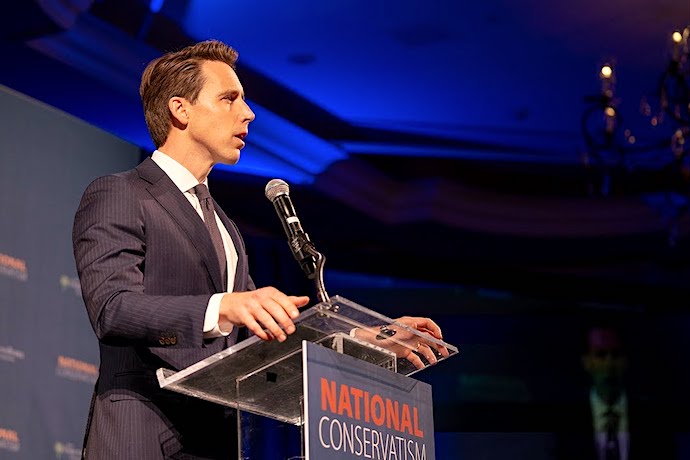“Most people can’t even articulate a political thought. Like, why do they get to vote? It’s stupid.”
It’s the evening of September 11, and I’m sipping whiskey by the bar at a 4-star resort hotel in Miami, as a 29-year-old financial analyst, R., outlines his desire to dismantle democracy with an intense, focused composure. All around us, dozens of mostly young white men sporting smart blazers—a motley crew of conservative political operatives, think tank analysts, journalists, academics, and students—mingle by the resort’s open-air pool and palm trees, cigars and drinks in hand, sharing their own distaste for liberal democracy, and their plans to turn that distaste into action. One day into the third annual National Conservatism conference, and after a long afternoon of impassioned speeches about the culture war, R. is fired up—and maybe slightly drunk.
“I reject equality,” R. tells me as I strain to hide my alarm behind a veneer of curiosity. Citing fascist thinkers like Julius Evola and Carl Schmitt, he endorses white nationalist ‘race realism’—the pseudoscientific theory that different racial groups carry biological and genetic differences that manifest in group disparities in IQ, wealth, moral and social norms, and more—and rails against “bio-Leninism,” the Left’s supposed strategy to mobilize biologically low-status social groups in order to win power.
What’s needed, R. tells me, is “a status hierarchy where you have a healthy society, with good values promoted and degenerate things shunned.” If he could snap his fingers and institute his ideal political system in the US overnight, I ask him, what would it be? “An absolute monarchy,” he replies without hesitation. “If you don’t have a positive vision of what your morality should be, and have the conviction to say, ‘we’re right, everyone has to obey these rules’—then the Left will impose their shitty rules, like chopping up children in the womb, or ridiculous things like pregnant men.”
All around us, conference attendees continue to sip cocktails, exchange business cards and discuss their own fervent opposition to bodily autonomy, LGBTQ rights, racial justice movements like Black Lives Matter, ‘wokeness,’ and liberalism more broadly, alongside more bread-and-butter topics like the challenges of working on Capitol Hill, conservative legal strategy, and the likelihood of a DeSantis presidential run in 2024. I ask R. if his penchants for natural inequality, hierarchy, and dominance are popular among other NatCon attendees.
Undoubtedly, he replies. But while most of the Extremely-Online movements that espouse these ideas, like the white nationalist America First/groyper movement or the neoreactionary ‘Dark Enlightenment’ movement, have been politically marginal and ineffective, the people gathered at NatCon know how to get things done. They understand, as R. puts it, that “you have to try to operate within the rules of the game…you have to try and kill the bio-Leninist regime from within.”
Building a movement
National Conservatism is an intellectual and political movement, launched by Israeli academic Yoram Hazony in 2019 to build the ideological scaffolding for a robust illiberal nationalist movement in America, one strong enough to outlast the Trump presidency and reshape the American political landscape. Since its inaugural conference, NatCon has served as a platform to draw together a heterogeneous assortment of academics, journalists, political operatives, elected officials, and other thought leaders and movement builders on the Right.
“NatCon has always been a very wide tent,” Hadar Hazony, Yoram’s son, a conference staffer and Notre Dame grad student, tells me as he rolls me a cigarette beside the resort’s sprawling golf course. “The goal is to create a conversation. Let’s say we think the mainstream has failed on all the various issues. What are the alternatives?”
NatCon III reads like a who’s-who of the thought leaders, opinion shapers, policy makers and foot soldiers of the rightward flank of the MAGA ecosystem. Intellectuals from right-wing journals like First Things and The American Conservative rub shoulders with journalists from outlets like American Greatness and The Epoch Times; policy analysts from think tanks like the Claremont Institute and the Heritage Foundation; and representatives from organizing outfits like American Moment and Young Republicans chapters. Conservative leaders of Protestant seminaries, Catholic theologians, and Orthodox Jewish rabbis affirm an interfaith reactionary alliance long in the making—one that Hazony, in his plenary speech, hopes will “have the ability to teach America to repent.”
Less a disciplined political machine than what venture capitalist and hard-right political kingmaker Peter Thiel—who’s delivered the opening keynote at all three NatCon conferences in the US—calls a “ragtag Rebel alliance,” the array of voices clustered under the NatCon banner align around a number of goals and priorities. These include a near-total moratorium on immigration (whether documented or not); a robust Christian nationalism to dominate the public square; a rollback of LGBTQ rights; economic nationalism and opposition to “globalist” supranational institutions; hostility to China as a civilizational enemy; a seething vendetta against so-called “woke elites” in cultural, academic, economic and governmental institutions; a fuzzy, ill-defined economic populism; and an increasing willingness to “get comfortable,” as thought leader Rod Dreher puts it after the conference, “using state power to achieve conservative ends.”
“You’ve been dispossessed”
What unites the NatConners, beyond any specific policy lane or proposal, is the burning conviction that societal institutions are in decay, degeneracy and collapse—from the military to churches, public schools to government institutions, corporations to sports teams, and most distressingly of all, the conservative movement. This is due to what one called the “cancer” of wokeness and can be traced back, for many, to the entire Enlightenment project of liberalism, democracy and human rights itself.
Only a foundational spiritual renewal—grounded in what they claim to be the timeless, eternal truths of Biblical conservatism—can cleanse the body politic of the US and the West from the corrupting sins of relativism, subjectivism and ‘wokeness’ and institute a new regime of ‘virtue.’
Recycling a litany of woes familiar to anyone who watches Fox News—from the presence of trans women athletes on sports teams, to Diversity, Equity and Inclusion (DEI) initiatives in corporate boardrooms; from woke universities to Drag Queen Story Hour—most speakers at NatCon offer little more than an intellectual sheen, an anti-modern flourish, to the rote and tired moral panic that characterizes today’s conservative movement.
Each speaker races to outdo the next in offering the most bleak and doom-laden prognosis of the fallen era.
“2020,” announces movement founder Yoram Hazony in hushed tones to begin Monday morning’s plenary, “was a watershed year in the history of the United States [and] in the history of the democratic world…a change in [the] political paradigm, in the basic framework that guides public life in the United States, and in Britain, and across Europe.”
What caused this world-historical civilizational shift? Well, Hazony explains, the New York Times fired a few employees for platforming racist op-eds in the midst of the George Floyd uprising, and Princeton University removed Woodrow Wilson’s name from a few buildings on its campus.
Staring down the specter of 2020, and its watershed wokeness, Brad Littlejohn, a fellow in the Ethics & Public Policy Center’s Evangelicals in Civic Life Program, evokes the French and Russian Revolutions, decrying the “utopian delusions” of “revolutionaries from 1789, to 1917, to 2020” who erroneously thought politics should not only “promote and support virtue,” but should “usher in universal harmony.”
The bottom line, as Hazony puts it, is that “you’ve been dispossessed. And what we’re watching…is a completely new America in which liberalism has been replaced by this woke neo-Marxism as the dominant ideology.”
And so now, “for us Christians,” as Rod Dreher, senior editor at the American Conservative and post-liberal Christian thought leader, puts it in his Tuesday plenary, “the country we used to regard as a ‘shining city on a hill’ has become an American Babylon. We dwell there in exile. We cannot allow ourselves to be deluded about this reality.”
Heritage is part of your movement
Watching a sizable segment of the country’s political elite one-up each other in overwrought passion plays of victimhood at a 4-star resort hotel in Miami is amusing enough, but it’s hard to overlook the dark side. In ceaselessly casting themselves as ruthlessly dominated by a totalitarian Left in the soft-power realm of culture, they preemptively grant themselves permission to use actual state power to aggressively roll back LGBTQ rights, crush racial justice movements, and enact other fantasies of repression at the local, state and national level.
And while NatCon has cast itself, since its founding, as the radical outsider in a dubious battle against a moribund conservative establishment (which, as they like to say, “has failed to conserve anything”), today the movement is closer to the heart of power than ever. NatCon III features speeches from leading MAGA politicians like Senators Josh Hawley, Marco Rubio and Rick Scott; rising standard-bearers like hard-right Arizona Senate candidate Blake Masters; and Florida Governor Ron DeSantis, whose hour-long plenary after dinner on the first night reads like a stump speech for his heavily-rumored 2024 presidential campaign.
“I would certainly vote for Ron DeSantis,” Paul Gottfried, the paleoconservative intellectual who, along with white nationalist Richard Spencer, coined the term ‘alt-right’ in 2008, tells me in the hallway, summarizing the mood felt by many at NatCon. “He’s a lot better than Trump, because Trump is incoherent; he’s infantile rage; he’s gonna drag down the party. [DeSantis] is more conservative, articulates his positions effectively, and is more effective in dealing with the other side.”
In his opening speech, Peter Thiel cautions against “the temptation on our side” to focus on “nihilistic negation” of “woke insanities” and other critiques of the Left. But the Right, he charges, must “also have more of a positive agenda…nihilistic negation is probably not enough—it might be enough to win in the midterms in ‘22, and it might be enough to win in ‘24, but we want to have something that’s somewhat more of a program, a positive vision to be credible.” DeSantis, he offers, “is probably the best of the governors in terms of offering a real alternative.”
But perhaps the most striking sign of the growing intimacy between NatCon and the conservative establishment it seeks to supplant occurs Monday afternoon, when Kevin Roberts, newly-appointed President of the Heritage Foundation—a flagship think tank at the heart of the conservative movement since the Reagan era—takes the stage after Yoram Hazony to announce his conversion to the cause.
“Very few political movements have as historic a legacy to secure as yours—and I’m proud today to say—as ours,” he emphasizes. “For I come to this convention as President of the Heritage Foundation to extend my gratitude for the ideas and energy national conservatives have injected into the national debate, and my fellowship with the principles you advance…I come not to invite national conservatives to join our conservative movement,” he concludes to vigorous applause, “but to acknowledge the plain truth—that Heritage is already part of yours.”
Roberts’ proclamation is “a huge step for NatCon,” Hadar Hazony tells me the next day. “I think that’s the most important thing that’s happened at the conference.” In the days following the conference, observers on Twitter call Roberts’ endorsement “the real major political shift at NatCon,” and, “the moment they went mainstream.” With an establishment battle-tank like Heritage on board, NatCon appears poised to set the conservative agenda moving forward.
Alongside these and other legacy organizations, a new crop of conservative institutions, staffed mainly by young leaders, swarms the stage and halls of NatCon. One of the most popular, it seems, is American Moment, an organization formed in 2021 to “identify, educate, and credential young Americans” to become, as its founders put it in an op-ed, “the cadre of staffers, operators, and leaders who will do the nuts-and-bolts work behind the scenes” in future conservative state and national administrations.
Some of the Gen-Z college students who frequent the American Moment table speak to me. There’s a realignment on the Right, they explain; national conservative ideas are gaining ground, and American Moment provides fellowships on the Hill to help them get their foot in the establishment door. On a panel addressing the ‘NatCon Governing Agenda,’ Saurabh Sharma, founder of American Moment, explains:
“President Trump got elected on a platform of American greatness anew, but was unable to implement it because we didn’t have the people he needed to staff the political bureaucracy and get things done. That will never happen again: my friends and allies will spend every last moment of our energy ensuring that.”
His organization’s task, he explains, is to “work tirelessly to take the ideas delivered from these stages and implement them in the halls of power.”
Read the second part here: White Nationalist Ideology Shines Through at Elite MAGA Conference: Inside NatCon Part II.




